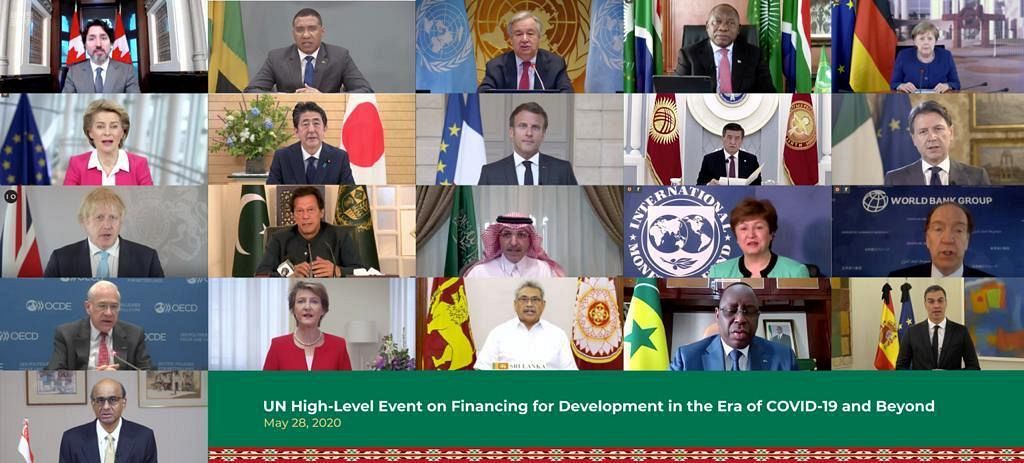
JEDDAH: Members of the G20’s Think 20 (T20) engagement group on Tuesday discussed migration, ways to tackle youth unemployment, and how innovative policies and programs to encourage cross-generational engagement might be developed.
The webinar for the T20’s Task Force 9 on Migration and Young Societies was hosted in cooperation with Jordan’s Center for Strategic Studies. The participants included representatives of research centers, government bodies and civil-society organizations.
The event featured two panel discussions that focused on the ways in which migration might shape the future, and how new digital platforms will affect the experiences of migrants, women and children.
During her opening speech, Princess Maha bint Mishari, the lead co-chair of the task force, emphasized the severity of the demographic challenges faced by societies and migrants, and the negative effects of the COVID-19 pandemic on “already vulnerable” groups. She said the challenges facing young people, women and migrants have been heightened by economic and educational shutdowns, closed borders and lack of healthcare infrastructure in many places.
She also noted that under King Salman, Saudi Arabia has made remarkable and unprecedented progress on many levels, politically, socially, economically and developmentally.
“These achievements are the pillars of the Vision 2030 reform program, (and show) that the Saudi leadership is committed to its pledge to build a state for the future and consolidate its position in the G20,” she said.
Paolo Magri, the executive vice president and director of the Italian Institute for International Political Studies, said that efforts to address migration issues require a multilateral approach involving countries of origin, transit and destination.
“This is especially true in light of the rising disruptions caused by the COVID-19 pandemic,” he said. “On migration, the pandemic has been a source of disruption in migration channels, the international agenda and capacity. These three major disruptions might endanger the prospects of improving migration governance.”
Amal El-Ouassif, a specialist in international relations at the Policy Center for the New South, discussed trends in African migration, changes caused by the pandemic, and the lessons that can be learned from experiences during the health crisis.
“It is important to understand what we expect in the near future,” she said. “Intro-African migration will predominantly remain within the continent, as 80 percent of migration happens within the continent.”
She added that G20 countries have a vested interest in African migration issues because much of the migration in Africa is to countries that are G20 members.
Fahad Al-Sharif, a senior research fellow at King Faisal Center for Research and Islamic Studies, highlighted some of the factors that have affected global migration over time, including early movements of humans, the two world wars, and now the pandemic.
“Many types of migrations have emerged through time, depending on the geographic, socioeconomic and push-and-pull factors,” he said. “For example, forced migrations caused by civil wars, natural disasters and ethic cleansing, among many other things.”
He also discussed legal and seasonal migrations, as well as undocumented migrants and issue of migration during the pandemic.
“Countries should deliver policies in support of irregular migrants,” Al-Sharif said. “Even though COVID-19 proved our unpreparedness and vulnerability, it also created a new opportunity for us, as individuals and countries, to engage in finding new, creative, compassionate and usable policies to face the future.”
He also offered some recommendations for ways in which the needs of undocumented migrants can be better addressed in the COVID-19 era.
“We should increase trust between these communities and health authorities,” he said. “We also need to assure communities that their members will not face any punishment.
“We also have to implement a system that allows undocumented migrants to call emergency services without the threat of retaliation. Moreover, we need to develop more robust and long-term cooperation with foreign embassies to facilitate the identification of undocumented migrants and their presence in their countries.”
The webinar concluded with a speech by Ziad Eyadat, the director of the Center for Strategic Studies, and closing remarks by Fahad Al-Turki, chair of the T20.
Saudi Arabia holds the presidency of the G20 this year and the group’s annual summit is due to be held in Riyadh in November. The T20, a network of think tanks and researchers, is one of several independent G20 engagement groups led by organizations from the host country. They focus on different sections and sectors of society and work to develop policy recommendations that will be presented to G20 leaders for consideration.
The Migration and Young Societies task force focuses on finding ways to develop skills and opportunities among young people, and encourage macroeconomic and microeconomic policies that address high youth unemployment, demographic changes, economic growth and the reform of social systems.
It is one of 11 T20 task forces working to develop research and policy recommendations on issues such as economic development, climate change, women and youth, technology and innovation, multilateralism, financing, food security, access to water, and methods of solving complex problems. They operate under the presidency of King Abdullah Petroleum Studies and Research Center, and King Faisal Center for Research and Islamic Studies.












